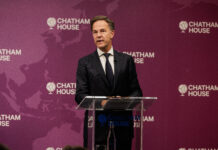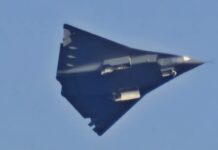
German Chancellor’s Maiden Visit to India Rekindles Interest in Indian Submarine Deal
Suman Sharma
High on promises, Olaf Scholz’s maiden visit to India as Chancellor had plenty to unpack, including the pending Indian naval submarine deal (codenamed Project-75 (India), or P-75(I), the impact of the ongoing Russia–Ukraine war, the free trade agreement (FTA), the Indo-Pacific region and the upcoming bilateral intergovernmental consultations (IGC), which will lead to the signing of the twin agreements on cooperation in clean energy and green hydrogen, and on technology and innovation.
The two-day visit, coming close on the heels of the first anniversary of the Ukraine–Russia conflict, was Scholz’s first visit to India this year from a total of three that he will undertake. The second visit will be in September for the G20 Summit, which New Delhi will host as current G20 President, followed by a third visit later this year for the India-Germany bilateral IGC.
In the course of the past year, Indian Prime Minister Narendra Modi and Chancellor Scholz have had three meetings – at the G20 Bali summit, the G7 meeting in Germany, and at the IGC, all of which have witnessed a certain understanding between the two leaders.
One of the main highlights of this visit was Berlin welcoming New Delhi’s efforts for a peaceful settlement in the ongoing Ukraine–Russia war. The Scholz visit was preceded by India abstaining from the UN General Assembly vote condemning Russia’s actions, but the German leader made it clear during his talks with Modi, that Berlin respected New Delhi’s repeated calls for dialogue and diplomacy to resolve the conflict, hoping that India will comply with what needs to be done under its G20 Presidency.
The other important aspect of the visit was Germany spelling out its firmness for the Indo-Pacific policy, which explains Chancellor Scholz’s visits to China, Japan and ASEAN countries too. Geo-strategically located, India plays a pivotal role in the Indo-Pacific, which justifies European nations making a beeline to explore possibilities of strategic cooperation with New Delhi.
Former Indian Ambassador to Germany, Gurjit Singh says, “Germany wishes to engage with India, the G20 President, to try and see if a middle ground for diplomatic manoeuvres could be opened. India is a salient partner in the climate agenda, the Indo-Pacific, new opportunities for German companies and the like. Germany wants to make the most of this partnership.”
The Indian Ministry of External Affairs (MEA) noted in its statement: “The India-Germany Strategic Partnership is underpinned by shared values, trust and mutual understanding. Robust investment and trade linkages, cooperation in the areas of green and sustainable development and growing people-to-people ties have strengthened bilateral relations.”
P-75(I)
The long pending deal for six conventional diesel-electric submarines, valued at USD 6 Bn for the Indian Navy, saw a ray of hope when the Indian Government issued the request for proposal (RFP) to five global vendors in 2021, but P-75(I) hit a roadblock soon after, owing to the withdrawal of almost half of the competitors, thereby resulting in the extension of the RFP deadline twice in the past year.
The competing global manufacturers who received the RFP were: France’s Naval Group for its Scorpène class submarine; Germany’s thyssenkrupp Marine Systems, which offered the Type 214; the Russian Rosoboronexport’s Amur-1650 class (Lada class derivative); South Korea’s DSME Type 3300; and Spain’s Navantia S-80 boat.
French Naval Group pulled out of the competition owing to non-compliance of certain clauses in the RFP, followed by Russia. Germany was represented by thyssenkrupp Marine Systems (TKMS). Mandatory clauses in the RFP such as the foreign original equipment manufacturer (OEM) partnering with an Indian firm to construct the submarines in India under a joint venture and the technology transfer for fuel-cell based Air Independent Propulsion (AIP), turned out to be sticking points for most foreign firms, resulting in withdrawals from the tender, with date extensions and delays leaving the existing competitors apathetic towards the deal.

In a bid to counter China’s the expanding influence in the Indian Ocean, the Indian Navy has been desperate to replace 11 out of the 16 from its existing submarine fleet with new conventional boats, as the ageing fleet is more than two decades old.
Thyssenkrupp CEO Martina Merz was part of the accompanying business delegation during Chancellor Scholz’s visit. TKMS was a frontrunner in this deal, but later withdrew. The high-level visit is believed to have revived Germany’s interest in the Indian submarine deal, following the discussions between both leaders. This also enables the West to reduce India’s dependence on Russia for arms imports.
Former Indian Naval Chief Adm. Karambir Singh (retd) stated, “P-75(I) is long overdue. As per the 30-year submarine building plan, these submarines should have been acquired by now. A decision to build them through the strategic partnership model was taken in 2017. The case is still with the MoD. The German TKMS design is certainly the best and we should be working hard to close this absolutely critical deal at the earliest.”
Suman Sharma




![BVRAAMs: Closing the horizon This photo showing a piece of the wreckage of an Indian Rafale, serial number ‘BS 001’, showed up on social media shortly after the IAF’s night operations of 6/7 May 2025. [Vigorous Falcon X Account]](https://euro-sd.com/wp-content/uploads/2025/06/Rafale-Wreckage-Piece_Vigorous-Falcon-X-Account-Kopie-218x150.jpg)







